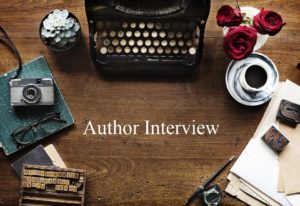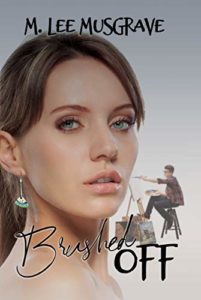An Interview with M. Lee Musgrave
 Author interviews allow me to meet all sorts of people, which is one of the reasons I like to conduct them. M. Lee Musgrave, fellow 2021 Debuts author, is the sort of person I might never have crossed paths with, though we’d have a lot to discuss. M. Lee is a hiker, artist, curator, and writer and his debut novel, Brushed Off, released in early March. While M. Lee doesn’t have much of a writing routine—he says, “I write when I feel I want to. I write one to two thousand words, read them aloud, make adjustments then write some more or stop for the day”—his process is paying off: he’s hard at work on the sequel to his debut novel. Many thanks to M. Lee for taking time away from his busy day to answer a few questions.
Author interviews allow me to meet all sorts of people, which is one of the reasons I like to conduct them. M. Lee Musgrave, fellow 2021 Debuts author, is the sort of person I might never have crossed paths with, though we’d have a lot to discuss. M. Lee is a hiker, artist, curator, and writer and his debut novel, Brushed Off, released in early March. While M. Lee doesn’t have much of a writing routine—he says, “I write when I feel I want to. I write one to two thousand words, read them aloud, make adjustments then write some more or stop for the day”—his process is paying off: he’s hard at work on the sequel to his debut novel. Many thanks to M. Lee for taking time away from his busy day to answer a few questions.
Christina: Your debut novel, Brushed Off, is a suspense that Cecil Brewer says “paints an interesting and revealing series of passages about the Los Angeles art scene.” Aside from liking mystery and suspense books, why did you choose that genre to highlight the art scene?
M. Lee: You are right, I’ve always enjoyed reading romantic suspense stories, especially those set in a major city such as Los Angeles … and as I had made up my mind in the third grade that art would be a major part of my life, it felt very natural to bring all of those things together into a cohesive story. In other words, I followed the well-worn edict “write what you know.” Most captivating stories not only have an engaging plot but reveal the emotions the characters experience through the plot, and when those emotions are relatable, the reader is more likely to embrace the story, the characters, and the setting. I also wanted to make the art community more accessible to a greater audience; reveal more about how it functions; share more of its compassion, its humanity.
Christina: Brushed Off is actually a mixed genre story, why did you choose to write the plot as such?
M. Lee: To me, love is the principal force behind human life so I wanted it to be front and center in a classic tale of good versus evil. To do that I felt it would be best to be inclusive in my creating of characters. I selected to have a young woman who is determined to change the course of her life for the better; a married up-and-coming socialite who will find her true love and destiny, and a loner artist who will discover his significance to his friends and the community. The main characters, James and Nicole, are a sort-of leisure-couple who enjoy copious sex and flirtatious banter with a playfulness in how they treat each other. James is often lyrical and witty on the surface but essentially brave and brilliant. I strived to make his delivery often droll and insinuating, but most often knowing and yet innocent at the same time. Which makes the murders and the mystery somewhat insignificant compared to the personal relationship between James, Nicole, and their friends. Plus I made sure they include their dog, Duie, in most of their activities. In tone and intent the story presents a visual-ness of elegant people at the beach, attending art gallery receptions and studios, dining in restaurants and partying in luxurious homes as well as SoCal itself serving as a major character in the plot. So the story is not just about solving a series of murders, it is about living life as a kind of artwork within a thrilling local. It’s a romantic, amateur sleuth, buddy, murder mystery … with a dog.
Christina: You’re a professor of art and curator, with several decades of experience in the art world. What similarities do you find between writing and painting? What differences do you find? Do you prefer one over the other?
M. Lee: I’m very fond of stating that my writing stems from my art activities. If I didn’t work in my studio (almost daily) I doubt that I would be able to write. That said, for me, creating art and creative writing are analogous. There are more physical things that must be present to create artwork (canvas, brushes, paint, pencils, good lighting, etc.) compared to just a computer for writing, but I approach both in a very organic, intuitive manner. I do not preplan a painting, drawing, photograph or a story. I simply begin by letting it flow from me. I’m able to do so because I know myself.
Christina: What did you edit out of Brushed Off, and was it difficult to do? Was it your idea to edit out that portion of the story or someone else’s?
M. Lee: Brushed Off was professionally edited twice and there were no structural changes made either time. One of the editors stated surprise that the identity of the killer was suggested earlier than “normal” but didn’t feel it needed to be changed. I tend to edit myself as I progress … in other words, when I finish a section or chapter I read it aloud and edit out (or re-arrange) anything that sounds wrong. In that process, I did remove a couple sections where I spent too much time talking about art. My publisher ran the final manuscript through a computer editing program, which revealed I’d used the word ‘that’ in places where it wasn’t necessary … I deleted most of them.
Christina: What role does color play in your artistic process? What role does it play in your writing process? Is color something you bring into your written stories organically, or does it come out in revision?
M. Lee: It is definitely organic. I am very visually orientated and gain a great deal of pleasure in looking at my world every day. This is a particular trait I instilled in the main character (James) especially in the first part of Brushed Off. I wanted to have the reader recognize how an artist sees the world.
Christina: In 1968, you “began making paintings and drawings about our relationship to (and reliance on) trees.” What did you hope to accomplish with those paintings? Does this relationship come out in your writing? If not, do you think it will in future works?
M. Lee: Wow! You did some serious research. Yes, I am a tree hugger and have been so since I could walk. As a child I was always climbing trees. When I was seven, I fell out of a very tall one, breaking my arm and terrifying my mother. In 1961, U.S. Forces began spraying the herbicide Agent Orange over the rural landscape of Vietnam to defoliate trees. I was deeply distraught, and it came out in my artwork and still does. Over the years I’ve completed a great many paintings and drawings expressing my feelings and always welcome any opportunity to exhibit them. As to whether my feelings about them comes out in my writing, only in subtle ways. However, I’m currently about 75 percent through writing the sequel to Brushed Off, and I did include more direct references to trees.
Christina: It’s always fun to hear a little bit about a debut author’s journey to publication. Would you share yours?
M. Lee: The first draft of Brushed Off was written in the late 1980s, but I wasn’t happy with it and set it aside until 2017. In that year, my wife and I started construction of a new house and put our current one up for sale … it sold much quicker than we anticipated, so we moved into a small trailer while the new house was being built. Needless to say I didn’t have a studio, so I directed my creative urges toward the book again and completed it within a few weeks. I then set about sending out query letters to literary agents (because that’s what all the online advisors said I had to do). I received several very positive and encouraging responses, but no representation offers. So as I have never had the need for an art agent I thought I would approach some independent publishers on my own. I did and quickly received two contract offers. Most writers I’ve spoken with will tell you that a debut author has very little chance of landing a top agent and even less chance of getting a contract from one of the big five publishers, so I’m very happy I didn’t waste much time pursuing that elusive goal.

M. Lee can be found multiple places!
Website: leemusgrave.com
Facebook: Lee Musgrave
Instagram: @lee musgrave_art
Thanks to M. Lee for agreeing to this interview! If you know of an author who’d like to be featured in an interview (or you are an author who would like to be featured), feel free to leave a comment or email me via my contact page.
